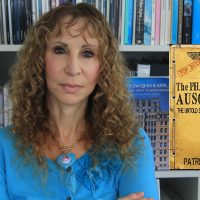Into the Deep with Author Patricia Posner

PATRICIA POSNER was born in London and spent half of her life in the U.K. and half in the U.S.A.
For thirty years Posner worked on 12 books of investigative historical nonfiction with her husband, bestselling author Gerald Posner. On those projects, she conducted every interview with him, sifted through thousands of pages of original documents in government and private archives, and worked on the early drafts of manuscripts. As a 2009 St. Petersburg Times profile of Mr. Posner correctly noted: “Trisha Posner works with him on his books and joins him in his interviews, but refuses co-author credit.”
Patricia Posner has always been greatly interested in the history surrounding World War II and the Holocaust. She has long been been fascinated by the mostly untold story of Victor Capesius, an ethnic German from Romania who ended up as the chief pharmacist at Auschwitz, the largest Nazi concentration camp. She learned about Capesius in 1985 when working with Mr. Posner on the biography of the Nazi Angel of Death, Dr. Josef Mengele (Mengele). During later projects with her husband, she was able to delve further into World War II and the Holocaust. In 1991 there was a book collection of interviews with the children of Nazi perpetrators (Hitler’s Children); in 1994 a New Yorker article “Letter from Berlin: Secrets of the Files,” in which she and her husband were two of the last researchers allowed full access to the millions of Nazi party membership files in the Berlin Document Center prior to the U.S. transfer of those papers to German custody; and in 2015 another book investigation, this time into the Vatican Bank and how the Catholic Church profited from the Holocaust by secret investments into German and Italian insurance companies that escheated the life insurance policies of Jews sent to Auschwitz (God’s Bankers).
While collecting information about Capesius over the years, Patricia Posner also launched her own solo writing career. In the late 1990s, she started a monthly column about developments in women’s health. Having come from a family with a long history of breast cancer, Posner was highly skeptical of the general pharmaceutical and medical advice that all women should rely on hormone replacement (HRT) for menopause. In 2000, Random House/Villard published her memoir casting doubts on the efficacy of universally prescribed HRT and presented her program for passing through menopause naturally. In 2003, after a landmark medical study, the Women’s Health Initiative, was published and confirmed many of the alarming health risks Posner had addressed in her book, Villard published an updated paperback titled No Hormones, No Fear.
From 2005 to 2007 Posner wrote two columns for Miami’s Ocean Drive magazine, one about developments in health and the other covering everything from local politics to battles over historic preservation to a much cited profile of magazine editor Tina Brown. She has also written for Salon, Huffington Post, and The Daily Beast, as well as having appeared to discuss her reporting, among others, on NBC’s TODAY, MSNBC, and FOX.
Posner’s biography about Capesius (The Pharmacist of Auschwitz: The Untold Story) is the ideal intersection of her interest in the history of World War II and the Holocaust and her earlier reporting on the pharmaceutical industry and public health.
The videos below are organized by topic and run between 30 seconds and 3 minutes. Click on any video. You must be connected to the Internet to view the videos.
OVERCOMES CHALLENGES TO SUCCEED: 1:02 min.
INSIGHT & INSPIRATION: 1:00 min.
EMPATHY: 0:32 sec.
PERSEVERANCE FURTHERS: 0:52 sec.
CRITICAL THINKING: 3:02 min.
STRONG DRIVE FOR ACHIEVEMENT: 1:08 min.
COLLABORATION: 0:56 sec.
COLLABORATION: 1:56 min.
CURIOSITY: 1:03 min.
CRITICAL THINKING: 1:37 min.
INSIGHT: 1:53 min.

